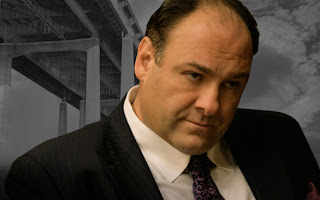
When I think about "The Sopranos", which I began watching around Season 4, I think about how the overall quality of television has improved over the past decade or so.
No, seriously.
Don't get me wrong, there's a LOT of shit on TV right now. If you don't believe me, watch MTV at any given time for half an hour, and then watch "American Idol" for half an hour. You'll want to cry, and that's okay. If you look closer at network programming, however, you'll see that, over the last decade, the general structure of television shows has been revolutionized. Comedies have evolved out of the tedious three-camera format, ditched the laugh track, and found more relatable ways of making people laugh. Take a show like "The Office": the idea of characters breaking the fourth wall and addressing the camera, mockumentary-style, is an idea that would have never flied as soon as 10 years ago. Meanwhile, dramas have moved away from the starry-eyed soaps of the '80s and focused more on grittiness. Simply put, we are experiencing some of the most captivating, original premises for dramatic television ever; look at the far-reaching ideas behind shows like "Lost", "24", and "Big Love" if you don't believe me.
"The Sopranos" makes me think of all of these general improvements in thematic scope because I feel like it was responsible for starting a lot of these trends. It is a series about mobsters, in theory; in actuality, it is deeply psychoanalytic, unabashedly cold-hearted toward its protagonists, and more concerned with the moments of emotional clarity more than the moments of violence that have defined some of its most memorable moments. It is the anti-mob drama, the one that will always be remembered for being different from anything before it. Oh, and it was probably the best-written television show in history.
It surprises me how outraged I have read/heard people react toward its final episode, which was written and directed by series mastermind David Chase. Everyone expected a big, conclusive bow on the damn thing, either Tony getting killed or flipping or going into witness protection or doing something grandiose. He didn't. People expected a war between Tony's family and that of Phil Leotardo. Didn't happen; Phil got popped, almost predictably, after waving bye-bye to his grandkids at a gas station. People expected AJ to do something important, and to some extent, he did, by accepting the fancy lifestyle he had started to resent in favor of wild cynicism. Whatever. All of this seemed to be a pre-cursor for the final scene.
Fuck, man. That last scene. Tony and the wife and son, eating onion rings at a family restaurant, Journey playing on the jukebox, everything seeming to be FINALLY okay after a season of bickering and shootings and suicide attempts and dead Ukrainian Phil look-alikes. We see a shady man at the counter, looking over at Tony. AJ pops another onion ring in his mouth. Meadow has trouble parking the car. See, all of this is mind-blowingly important because it HAS to be; I have never seen a single unimportant camera shot while watching "The Sopranos", and I know that each one of these shots have been carefully constructed, as if to lead up to something. The man at the counter goes to the bathroom. The door of the restaurant opens, presumably Meadow. Tony looks up. Then -- black.
To those who could have possibly believed that their cable went out: seriously? Is that what you thought? You thought that David Chase gave you a monumental, action-packed ending, and your HBO wouldn't allow you to see it? You're only kidding yourself. This was the perfect ending to the show, in my opinion. Nothing tied up neatly, no one in a body bag, just Tony looking up as a door opens, probably scared out of his mind that THIS is his moment to pay for his sins, and we know he probably always will be. Some people have suggested that the cut-to-black represents Tony's death, the end he never saw coming. Others have suggested that nothing wrong has happened, that life goes on for Tony Soprano. Still others have said that the various people in the restaurant represent Tony's possible fates. To me, both theories are believable, but neither is definite. This series ended on an ambiguous note for a reason. Against all conventions, Tony was not given a Greek tragedy-esque end, nor was he given a damnation to continue walking the earth in suffering. We must take this as it a statement of uncertainty that the entire episode was trying to make clear: no one knows what exactly happened in that last scene, but isn't it so much more meaningful, so much more satisfying, that way? Here are things that the last scene reminded me of: the last sequence of "Broken Flowers", the last 15 minutes of "Mulholland Dr.", the thing Bill Murray whispers to Scarlett Johannson in "Lost In Translation", what the man in the road finally says in Radiohead's video for "Just". All of these are good things.
Admit it, you're still thinking about that ending, late at night when you can't sleep, when you're at work and staring into space, just mulling it over one last time in your mind. That's what a great conclusion to any work of art -- movie, TV series, book -- does. For years, "The Sopranos" left me entranced, and last night, it did so one last time. To all the haters who regard the ending with disgust: tell me specifically how it could have ended more impressively. Because I can't find a better way to close out a show as complex, subtle, and brilliant as this.
No comments:
Post a Comment